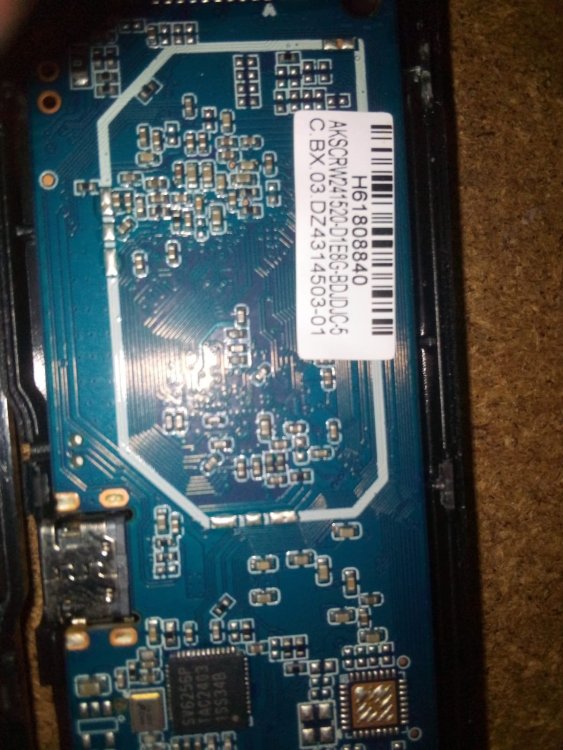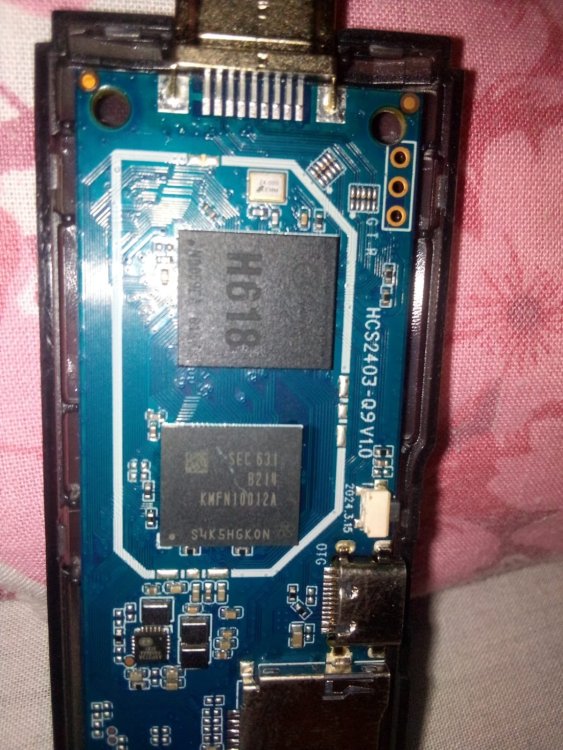Active threads
Showing topics posted in for the last 365 days.
- Past hour
-

I need the latest fully working image for Minix Neo U1. :)
thomaz replied to thomaz's topic in Amlogic CPU Boxes
"if you have ever booted a different distribution then your box will be incompatible with the Armbian build" are you serious? No matter after all this linux on arm shit problems i had last week, i really must say that a windows 10 + kodi.exe on a thin client is really the best in quality (dxva) and stability. And it only eats 1-2w more power than this u1 thingie. So, i just keep my moonlight on windows and put tvheadend together with the wintv solohd into a vmware player. bye bye. - Today
-
Great!! I'm glad you got it working!
-
You should also be updating your /etc/apt/sources.list.d/armbian.list as well (otherwise you will be mixing bookworm armbian packages with trixie debian packages)
-
First off, why do you want to? As the name 'edge' should imply, edge kernels are development kernels that are for testing purposes and may or may not work, and may break at any time. 'current' 6.12 in your case are LTS kernels that should be stable and more suited for non-development/testing use cases. If you do want edge kernels then you can use armbian-config to switch.
-
To maintain changes between different kernel versions, you can use overlays. I did this by following some dts changes from @ebin-dev. Add this line user_overlays=rockchip-rk3399-op1-opp rockchip-rk3399-l2-cache to /boot/armbianEnv.txt Copy the dtbo files to /boot/overlay-user (mkdir -p /boot/overlay-user if the folder does not exist). rockchip-rk3399-l2-cache.dtborockchip-rk3399-op1-opp.dtborockchip-rk3399-op1-opp.dtsrockchip-rk3399-l2-cache.dts
-
@JaydenWithaWhy I rebuilt and uploaded again a new copy of the multittol. Please download and try again, I tested successfully on a tvbox of mine and worked fine.
-
Hello, and thank you for the suggestions. Just to clarify, I am not using an ILI9341 or ST7789 display. My display is a ST7735S (1.8", 128x160), a generic model purchased from AliExpress. The main issue is that while this setup worked perfectly on older Armbian kernels, it's no longer working with the current Kernel 6.12.x. It seems like the necessary module might have been removed or changed in the newer versions. I am not using a desktop environment; my goal is to use the display directly from the console/framebuffer (no X11). I’ve made some progress, but now I’m stuck. Here’s what I'm observing: The system does create a framebuffer device at /dev/fb0. When I use a tool like fbi to show an image, it runs without any errors. If I try to dump the framebuffer device (e.g., cat /dev/fb0), it outputs data, which suggests something is being written to the buffer. The problem is on the physical display itself: the screen's backlight turns on, but it remains completely blank (white). No image is ever displayed. I'm unfortunately not sure how to proceed from here. It feels like the display is being initialized enough to turn on the backlight, but the actual image data isn't being displayed correctly. I suspect the driver is not sending the right commands. Does anyone have an idea what I could try next? Thank you!
-

Installing armbian on Yundoo Y8 TV box (RK3399)
Hqnicolas replied to FucusMeDeep's topic in Rockchip CPU Boxes
@FucusMeDeep don't throw yourself into this, I'm not the best example to be messing with junk, but times have changed, if it were really interesting I would recommend it. with that time and money I buy a board https://www.banana-pi.org/ anything that involves reinventing the wheel there is already ready, don't use material discarded by someone else. develop something on top of these boards, go further create something at a higher level than what you want to create. do this project with a more documented and healthy board: CH573F from Nanjing Qinheng Microelectronics Part of the document's included below: WCH 官方网站 www.wch.cn(zh-CN) / www.wch-ic.com(en) 时钟和电源 时钟: 32Mhz HSE 高速无源晶体输入 32.768k LSE 低速无源晶体输入 电源: 3.3V-5.5V电源输入,3.3V LDO最大100mA额外输出 USB电源串有二极管,防止电流倒灌 同时二极管可以通过短路焊盘旁路 5V带有TVS二极管 接口和按键 接口: 12Pin 2.54mm间距 I/O接口 * 2 按键: 复位/B23按键 * 1 Boot/B22按键 * 1 -

Efforts to develop firmware for H96 MAX M9 RK3576 TV Box 8G/128G
Hqnicolas replied to Hqnicolas's topic in Rockchip CPU Boxes
@RealAn DTS for Kernel 6.1: // SPDX-License-Identifier: (GPL-2.0+ OR MIT) /* * Copyright (c) 2024 Rockchip Electronics Co., Ltd. * Copyright (c) 2024 Radxa Computer (Shenzhen) Co., Ltd. * */ /dts-v1/; #include <dt-bindings/gpio/gpio.h> #include <dt-bindings/pinctrl/rockchip.h> #include <dt-bindings/input/rk-input.h> #include <dt-bindings/display/rockchip_vop.h> #include "rk3576.dtsi" #include "rk3576-android.dtsi" #include "rk3576-rk806.dtsi" #include "rk3576-virtual-poweroff.dtsi" / { model = "Rockchip RK3576 EVB1 V10 Board"; compatible = "rockchip,rk3576-evb1-v10", "rockchip,rk3576"; vcc_sys: vcc5v0-sys { compatible = "regulator-fixed"; regulator-name = "vcc_sys"; regulator-always-on; regulator-boot-on; regulator-min-microvolt = <5000000>; regulator-max-microvolt = <5000000>; }; vcc_2v0_pldo_s3: vcc-2v0-pldo-s3 { compatible = "regulator-fixed"; regulator-name = "vcc_2v0_pldo_s3"; regulator-boot-on; regulator-always-on; regulator-min-microvolt = <2000000>; regulator-max-microvolt = <2000000>; vin-supply = <&vcc_sys>; }; vcc_1v1_nldo_s3: vcc-1v1-nldo-s3 { compatible = "regulator-fixed"; regulator-name = "vcc_1v1_nldo_s3"; regulator-boot-on; regulator-always-on; regulator-min-microvolt = <1100000>; regulator-max-microvolt = <1100000>; vin-supply = <&vcc_sys>; }; vcc_1v8_s0: vcc-1v8-s0 { compatible = "regulator-fixed"; regulator-name = "vcc_1v8_s0"; regulator-boot-on; regulator-always-on; regulator-min-microvolt = <1800000>; regulator-max-microvolt = <1800000>; vin-supply = <&vcc_1v8_s3>; }; vcc_3v3_s0: vcc-3v3-s0 { compatible = "regulator-fixed"; regulator-name = "vcc_3v3_s0"; regulator-boot-on; regulator-always-on; regulator-min-microvolt = <3300000>; regulator-max-microvolt = <3300000>; vin-supply = <&vcc_3v3_s3>; }; vcc5v0_host: vcc5v0-host { compatible = "regulator-fixed"; regulator-name = "vcc5v0_host"; regulator-boot-on; regulator-always-on; regulator-min-microvolt = <5000000>; regulator-max-microvolt = <5000000>; enable-active-high; gpio = <&gpio0 RK_PC7 GPIO_ACTIVE_HIGH>; pinctrl-names = "default"; pinctrl-0 = <&usb_host_pwren>; vin-supply = <&vcc_sys>; }; vcc5v0_otg: vcc5v0-otg { compatible = "regulator-fixed"; regulator-name = "vcc5v0_otg"; regulator-min-microvolt = <5000000>; regulator-max-microvolt = <5000000>; enable-active-high; gpio = <&gpio2 RK_PD2 GPIO_ACTIVE_HIGH>; pinctrl-names = "default"; pinctrl-0 = <&usb_otg_pwren>; vin-supply = <&vcc_sys>; }; hdmi_sound: hdmi-sound { compatible = "rockchip,hdmi"; rockchip,mclk-fs = <128>; rockchip,card-name = "rockchip-hdmi"; rockchip,cpu = <&sai6>; rockchip,codec = <&hdmi>; rockchip,jack-det; }; gpio-keys { compatible = "gpio-keys"; autorepeat; power { debounce-interval = <100>; gpios = <&gpio0 RK_PD3 GPIO_ACTIVE_LOW>; label = "GPIO Key Power"; linux,code = <KEY_POWER>; wakeup-source; }; }; leds: leds { compatible = "gpio-leds"; work-green { gpios = <&gpio0 RK_PD1 GPIO_ACTIVE_LOW>; linux,default-trigger = "backlight"; default-state = "on"; retain-state-suspended; retain-state-shutdown; }; work-red { gpios = <&gpio0 RK_PD0 GPIO_ACTIVE_HIGH>; linux,default-trigger = "backlight"; default-state = "on"; retain-state-suspended; retain-state-shutdown; }; pwr-wifi { gpios = <&gpio1 RK_PC6 GPIO_ACTIVE_HIGH>; linux,default-trigger = "none"; default-state = "on"; retain-state-suspended; }; }; sdio_pwrseq: sdio-pwrseq { compatible = "mmc-pwrseq-simple"; pinctrl-names = "default"; pinctrl-0 = <&wifi_poweren_gpio>; /* * On the module itself this is one of these (depending * on the actual card populated): * - SDIO_RESET_L_WL_REG_ON * - PDN (power down when low) */ post-power-on-delay-ms = <200>; reset-gpios = <&gpio0 RK_PD2 GPIO_ACTIVE_LOW>; status = "okay"; }; wireless_bluetooth: wireless-bluetooth { compatible = "bluetooth-platdata"; uart_rts_gpios = <&gpio1 RK_PC2 GPIO_ACTIVE_LOW>; pinctrl-names = "default", "rts_gpio"; pinctrl-0 = <&uart4m1_rtsn>; pinctrl-1 = <&uart4m1_rts_gpio>; BT,wake_gpio = <&gpio1 RK_PD4 GPIO_ACTIVE_HIGH>; // BT,reset_gpio = <&gpio1 RK_PC7 GPIO_ACTIVE_HIGH>; BT,wake_host_irq = <&gpio0 RK_PB1 GPIO_ACTIVE_HIGH>; status = "okay"; }; wireless_wlan: wireless-wlan { compatible = "wlan-platdata"; pinctrl-names = "default"; pinctrl-0 = <&wifi_host_wake_irq>; WIFI,host_wake_irq = <&gpio0 RK_PB0 GPIO_ACTIVE_HIGH>; status = "okay"; }; ht5010_sound_out: ht5010_sound-out { compatible = "rockchip,dummy-codec"; clocks = <&mclkout_sai1>; clock-names = "mclk"; pinctrl-names = "default"; pinctrl-0 = <&sai1m0_mclk>; #sound-dai-cells = <0x00>; status = "okay"; }; ht5010-sound { compatible = "simple-audio-card"; simple-audio-card,mclk-fs = <256>; simple-audio-card,name = "rockchip,es8388"; simple-audio-card,format = "i2s"; status = "okay"; simple-audio-card,cpu { sound-dai = <&sai1>; }; simple-audio-card,codec { sound-dai = <&ht5010_sound_out>; }; }; spdif_tx0_dc: spdif-tx0-dc { compatible = "linux,spdif-dit"; #sound-dai-cells = <0x00>; status = "okay"; }; spdif-tx0-sound { compatible = "simple-audio-card"; simple-audio-card,mclk-fs = <128>; simple-audio-card,name = "rockchip,spdif-tx1"; status = "okay"; simple-audio-card,dai-link@0 { cpu { sound-dai = <&spdif_tx1>; }; codec { sound-dai = <&spdif_tx0_dc>; }; }; }; }; &cpu_l0 { cpu-supply = <&vdd_cpu_lit_s0>; }; &cpu_b0 { cpu-supply = <&vdd_cpu_big_s0>; }; &crypto { status = "okay"; }; &gpu { mali-supply = <&vdd_gpu_s0>; status = "okay"; }; &iep { status = "okay"; }; &iep_mmu { status = "okay"; }; &jpegd { status = "okay"; }; &jpege { status = "okay"; }; &jpeg_mmu { status = "okay"; }; &mpp_srv { status = "okay"; }; &rga2_core0 { status = "okay"; }; &rga2_core0_mmu { status = "okay"; }; &rga2_core1 { status = "okay"; }; &rga2_core1_mmu { status = "okay"; }; &rknpu { rknpu-supply = <&vdd_npu_s0>; status = "okay"; }; &rknpu_mmu { status = "okay"; }; &rkvenc_ccu { status = "okay"; }; &rkvenc0 { status = "okay"; }; &rkvenc0_mmu { status = "okay"; }; &rkvenc1 { status = "okay"; }; &rkvenc1_mmu { status = "okay"; }; &rkvdec { status = "okay"; }; &rkvdec_mmu { status = "okay"; }; &saradc { status = "okay"; vref-supply = <&vcca_1v8_s0>; }; &tsadc { status = "okay"; }; &vdpp { status = "okay"; }; &vop { status = "okay"; disable-win-move; vop-supply = <&vdd_logic_s0>; }; &vop_mmu { status = "okay"; }; &vp0 { rockchip,plane-mask = <(1 << ROCKCHIP_VOP2_CLUSTER0 | 1 << ROCKCHIP_VOP2_ESMART0 | 1 << ROCKCHIP_VOP2_CLUSTER1 | 1 << ROCKCHIP_VOP2_ESMART1)>; rockchip,primary-plane = <ROCKCHIP_VOP2_ESMART0>; cursor-win-id = <ROCKCHIP_VOP2_ESMART1>; }; &vp1 { status = "disabled"; }; &vp2 { status = "disabled"; }; &display_subsystem { clocks = <&hdptxphy_hdmi>; clock-names = "hdmi0_phy_pll"; }; &hdmi { status = "okay"; cec-enable = <1>; audio-no-capture; enable-gpios = <&gpio2 RK_PB0 GPIO_ACTIVE_HIGH>; }; &hdmi_in_vp0 { status = "okay"; }; &hdmi_in_vp1 { status = "disabled"; }; &hdmi_in_vp2 { status = "disabled"; }; &hdptxphy_hdmi { status = "okay"; }; &route_hdmi { status = "okay"; connect = <&vp0_out_hdmi>; }; &gmac0 { /* Use rgmii-rxid mode to disable rx delay inside Soc */ phy-mode = "rgmii-rxid"; clock_in_out = "output"; snps,reset-gpio = <&gpio2 RK_PB3 GPIO_ACTIVE_LOW>; snps,reset-active-low; snps,reset-delays-us = <0 20000 100000>; pinctrl-names = "default"; pinctrl-0 = <ð0m0_miim ð0m0_tx_bus2 ð0m0_rx_bus2 ð0m0_rgmii_clk ð0m0_rgmii_bus ðm0_clk0_25m_out>; tx_delay = <0x1b>; /* rx_delay = <0x3f>; */ phy-handle = <&rgmii_phy0>; status = "okay"; }; &mdio0 { rgmii_phy0: phy@1 { compatible = "ethernet-phy-ieee802.3-c22"; reg = <0x1>; clocks = <&cru REFCLKO25M_GMAC0_OUT>; }; }; &sai1 { status = "okay"; pinctrl-names = "default"; pinctrl-0 = <&sai1m0_lrck &sai1m0_sclk &sai1m0_sdi0 &sai1m0_sdo2>; }; &sai6 { status = "okay"; }; &sdmmc { max-frequency = <200000000>; no-sdio; no-mmc; bus-width = <4>; cap-mmc-highspeed; cap-sd-highspeed; disable-wp; sd-uhs-sdr104; vqmmc-supply = <&vccio_sd_s0>; status = "okay"; }; &combphy0_ps { status = "okay"; }; &combphy1_psu { status = "okay"; }; &u2phy0 { status = "okay"; }; &u2phy0_otg { phy-supply = <&vcc5v0_otg>; status = "okay"; }; &usb_drd0_dwc3 { extcon = <&u2phy0>; dr_mode = "otg"; status = "okay"; }; &usbdp_phy { rockchip,dp-lane-mux = <2 3>; status = "okay"; }; &usbdp_phy_dp { status = "disabled"; }; &usbdp_phy_u3 { status = "okay"; }; &u2phy1 { status = "okay"; }; &u2phy1_otg { phy-supply = <&vcc5v0_host>; status = "okay"; }; &usb_drd1_dwc3 { dr_mode = "host"; status = "okay"; }; &pinctrl { usb { usb_host_pwren: usb-host-pwren { rockchip,pins = <0 RK_PC7 RK_FUNC_GPIO &pcfg_pull_none>; }; usb_otg_pwren: usb-otg-pwren { rockchip,pins = <0 RK_PD1 RK_FUNC_GPIO &pcfg_pull_none>; }; }; wireless-bluetooth { uart4m1_rts_gpio: uart4m1-rts-gpio { rockchip,pins = <1 RK_PC2 RK_FUNC_GPIO &pcfg_pull_none>; }; }; wireless-wlan { wifi_host_wake_irq: wifi-host-wake-irq { rockchip,pins = <0 RK_PB0 RK_FUNC_GPIO &pcfg_pull_down>; }; wifi_poweren_gpio: wifi-poweren-gpio { rockchip,pins = <1 RK_PC6 RK_FUNC_GPIO &pcfg_pull_up>; }; }; }; &sdhci { bus-width = <8>; no-sdio; no-sd; non-removable; max-frequency = <200000000>; mmc-hs400-1_8v; mmc-hs400-enhanced-strobe; full-pwr-cycle-in-suspend; status = "okay"; }; &sdio { max-frequency = <200000000>; no-sd; no-mmc; bus-width = <4>; disable-wp; cap-sd-highspeed; cap-sdio-irq; keep-power-in-suspend; mmc-pwrseq = <&sdio_pwrseq>; non-removable; pinctrl-names = "default"; pinctrl-0 = <&sdmmc1m0_bus4 &sdmmc1m0_clk &sdmmc1m0_cmd>; sd-uhs-sdr104; status = "okay"; }; &spdif_tx1 { pinctrl-names = "default"; pinctrl-0 = <&spdifm1_tx1>; status = "okay"; }; &uart4 { status = "okay"; pinctrl-names = "default"; pinctrl-0 = <&uart4m1_xfer &uart4m1_ctsn>; }; &pwm0_2ch_0 { compatible = "rockchip,remotectl-pwm-v4"; pinctrl-names = "default"; pinctrl-0 = <&pwm0m0_ch0>; remote_pwm_id = <0>; handle_cpu_id = <1>; remote_support_psci = <0>; wakeup-source; status = "okay"; ir_key1 { rockchip,usercode = <0xfeaa>; rockchip,key_table = <0xec 0xe8 0xe6 0x9e 0xe9 0x67 0xe5 0x6c 0xae 0x69 0xaf 0x6a 0xee 0x66 0xe7 0x73 0xef 0x72 0xbf 0x74 0xbe 0x71 0xb3 0x8b 0xff 0x184 0xb1 0x18e 0xf2 0x18f 0xf3 0x04 0xb5 0x05 0xf6 0x06 0xf7 0x07 0xb9 0x190 0xfa 0x191 0xfb 0x0a 0xfe 0x0b 0xbd 0x0e 0xbc 0xb7 0xf0 0xba 0xb4 0x19c 0xb8 0x1e 0xb0 0x197>; }; ir_key2 { rockchip,usercode = <0xff00>; rockchip,key_table = <0xf1 0x69 0xe5 0x6a 0xfc 0x67 0xfd 0x6c 0xf8 0xe8 0xf9 0xb8>; }; ir_key3 { rockchip,usercode = <0x1dcc>; rockchip,key_table = <0xee 0xe8 0xf0 0x9e 0xf8 0x67 0xbb 0x6c 0xef 0x69 0xed 0x6a 0xfc 0x66 0xf1 0x73 0xfd 0x72 0xb7 0xd9 0xff 0x74 0xf3 0x71 0xbf 0x8b 0xf9 0x191 0xf5 0x192 0xb3 0x184 0xbe 0x02 0xba 0x03 0xb2 0x04 0xbd 0x05 0xf9 0x06 0xb1 0x07 0xfc 0x08 0xf8 0x09 0xb0 0x0a 0xb6 0x0b 0xb5 0x0e>; }; ir_key4 { rockchip,usercode = <0x7f80>; rockchip,key_table = <0xec 0xe8 0xd8 0x9e 0xc7 0x67 0xbf 0x6c 0xc8 0x69 0xc6 0x6a 0x8c 0x66 0x78 0x73 0x76 0x72 0x7e 0x74 0x7c 0x8b 0xb7 0x184>; }; ir_key5 { rockchip,usercode = <0xfe01>; rockchip,key_table = <0xec 0xe8 0xe6 0x9e 0xe9 0x67 0xe5 0x6c 0xae 0x69 0xaf 0x6a 0xee 0x66 0xe7 0x73 0xef 0x72 0xbf 0x74 0xbe 0x71 0xb3 0x8b 0xff 0x184 0xb1 0x02 0xf2 0x03 0xf3 0x04 0xb5 0x05 0xf6 0x06 0xf7 0x07 0xb9 0x08 0xfa 0x09 0xfb 0x0a 0xfe 0x0b 0xbd 0x0e 0xbc 0xb7 0xf0 0xba 0xb4 0x19c 0xb8 0x1e 0xb0 0x197>; }; ir_key6 { rockchip,usercode = <0xfd01>; rockchip,key_table = <0x31 0xe8 0x2f 0x9e 0x35 0x67 0x2d 0x6c 0x66 0x69 0x3e 0x6a 0x6a 0x66 0x5e 0x73 0x47 0x72 0x23 0x74 0x3a 0x184 0x0d 0x40>; }; ir_key6 { rockchip,usercode = <0xfb04>; rockchip,key_table = <0xf7 0x74 0xd0 0x184 0xb5 0x8b 0x5b 0xb8 0x4d 0xb7 0xba 0x67 0xb9 0x6c 0xb8 0x69 0xb7 0x6a 0xbb 0xe8 0xe5 0x9e 0xe4 0x0e 0xd2 0x66 0xfd 0x73 0xfc 0x72 0xf6 0x71 0xff 0x192 0xfe 0x193 0x04 0x40 0x14 0x41 0x4c 0x42 0x4b 0x43>; }; ir_key8 { rockchip,usercode = <0xe619>; rockchip,key_table = <0x8b KEY_POWER>, <0x98 KEY_UP>, <0x93 KEY_DOWN>, <0x96 KEY_LEFT>, <0x95 KEY_RIGHT>, <0x9e KEY_ENTER>, <0x61 KEY_BACK>; }; }; -
I have had a bit of time to do some testing (re: MMC disconnects) This bug does not appear in kernel 6.6 A version of this bug appears in 6.10, but without the full trace. Output at the point of disconnect is: [ 1082.901830] EXT4-fs error (device mmcblk0p2): __ext4_get_inode_loc_noinmem:4512: inode #25776: block 1769: comm cron: unable to read itable block [ 1082.914822] EXT4-fs (mmcblk0p2): Remounting filesystem read-only or [ 8235.333023] EXT4-fs (mmcblk0p2): shut down requested (2) It is worth noting that the device is noticeably more sluggish on this kernel (not measured, and may or may not be related) On kernel 6.12 The bug manifests with a full trace: [ 1956.200890] I/O error, dev mmcblk0, sector 9337968 op 0x1:(WRITE) flags 0xc800 phys_seg 1 prio class 2 [ 1965.163111] rcu: INFO: rcu_sched self-detected stall on CPU [ 1965.165764] rcu: 0-....: (57 ticks this GP) idle=9194/1/0x40000004 softirq=13082/13083 fqs=48 [ 1965.173801] rcu: (t=2142 jiffies g=20165 q=305 ncpus=4) [ 1965.179160] CPU: 0 UID: 0 PID: 78 Comm: kworker/0:3 Not tainted 6.12.49-current-meson #1 [ 1965.179720] Hardware name: Amlogic Meson platform [ 1965.179991] Workqueue: events dbs_work_handler [ 1965.180753] PC is at __netif_receive_skb_core.constprop.0+0x4/0x10a4 [ 1965.181411] LR is at __netif_receive_skb_list_core+0xf0/0x1f4 [ 1965.181948] pc : [<c10f55bc>] lr : [<c10f674c>] psr: 80030113 [ 1965.182280] sp : f0801d14 ip : 00000000 fp : c4000000 [ 1965.182583] r10: c211a108 r9 : 00000000 r8 : c4000000 [ 1965.182874] r7 : f0801d48 r6 : c400148c r5 : c211a108 r4 : c4e09900 [ 1965.183225] r3 : c2abbd80 r2 : f0801d44 r1 : 00000000 r0 : f0801d40 [ 1965.183585] Flags: Nzcv IRQs on FIQs on Mode SVC_32 ISA ARM Segment none [ 1965.184017] Control: 10c5387d Table: 05ad004a DAC: 00000051 [ 1965.184260] Call trace: [ 1965.184552] __netif_receive_skb_core.constprop.0 from 0xc4003640 [ 1965.262719] sched: DL replenish lagged too much [ 1990.096714] mmc0: card 0002 removed [ 1990.100368] Aborting journal on device mmcblk0p2-8. [ 1990.100590] JBD2: I/O error when updating journal superblock for mmcblk0p2-8. [ 1990.102743] ------------[ cut here ]------------ [ 1990.111672] WARNING: CPU: 0 PID: 131 at drivers/mmc/host/meson-mx-sdio.c:446 meson_mx_mmc_irq_thread+0x168/0x174 [ 1990.121734] Modules linked in: zram zsmalloc binfmt_misc snd_soc_meson_gx_sound_card snd_soc_meson_aiu snd_soc_hdmi_codec snd_soc_meson_card_utils snd_soc_meson_codec_glue snd_soc_core evdev snd_pcm snd_timer meson_ir snd rc_core soundcore meson_saradc thermal_generic_adc cfg80211 rfkill efi_pstore pstore [ 1990.148744] CPU: 0 UID: 0 PID: 131 Comm: irq/35-c1108c20 Not tainted 6.12.49-current-meson #1 [ 1990.148779] Hardware name: Amlogic Meson platform [ 1990.148791] Call trace: [ 1990.148807] unwind_backtrace from show_stack+0x10/0x14 [ 1990.148865] show_stack from dump_stack_lvl+0x54/0x68 [ 1990.148921] dump_stack_lvl from __warn+0x80/0x114 [ 1990.148980] __warn from warn_slowpath_fmt+0x184/0x18c [ 1990.149030] warn_slowpath_fmt from meson_mx_mmc_irq_thread+0x168/0x174 [ 1990.149088] meson_mx_mmc_irq_thread from irq_thread_fn+0x1c/0x7c [ 1990.149150] irq_thread_fn from irq_thread+0x138/0x21c [ 1990.149207] irq_thread from kthread+0xdc/0xf8 [ 1990.149270] kthread from ret_from_fork+0x14/0x28 [ 1990.149314] Exception stack(0xf106dfb0 to 0xf106dff8) [ 1990.149339] dfa0: 00000000 00000000 00000000 00000000 [ 1990.149365] dfc0: 00000000 00000000 00000000 00000000 00000000 00000000 00000000 00000000 [ 1990.149388] dfe0: 00000000 00000000 00000000 00000000 00000013 00000000 [ 1990.149420] ---[ end trace 0000000000000000 ]--- [ 1990.574529] EXT4-fs (mmcblk0p2): shut down requested (2) [ 1991.000606] mmc0: new high speed SDHC card at address 0002 [ 1991.001627] mmcblk0: mmc0:0002 00000 7.32 GiB [ 1991.006695] mmcblk0: p1 p2 [ 2041.955601] EXT4-fs warning (device mmcblk0p2): dx_probe:823: inode #593: lblock 0: comm bash: error -5 reading directory block [ 2041.961894] EXT4-fs warning (device mmcblk0p2): dx_probe:823: inode #593: lblock 0: comm bash: error -5 reading directory block [ 2041.974376] EXT4-fs warning (device mmcblk0p2): dx_probe:823: inode #593: lblock 0: comm bash: error -5 reading directory block If I were to speculate it looks like: initial bug introduced kernel 6.7 to 6.10 Bug was identified and the "fix"/"work around" has lead to the more verbose failure somewhere in 6.11 - 6.12 I went for the low hanging fruit first and can confirm the driver meson-mx-sdio.c is unchanged across all versions. I have also compared the DTBs: 6.6 -> 6.10 Significant changes 6.10 -> 6.12 Identical The changes looks to be the USB fix. I suspect that the issue is not with the DTB files, as the significant changes will be down to shifting phandle references by +1, If I get some more time tomorrow I will start by comparing whether the cards resolve consistently between 6.6 to 6.12 (thus eliminating DTB issues), and then drill into changes to the mmc/core and clk/meson drivers
- Yesterday
-
https://github.com/radxa-pkg/aic8800/releases/tag/4.0+git20250410.b99ca8b6-2 The above should get you to a useable page. Download the USB version of the .deb package. I stored mine in the /root but had to copy it to the /tmp directory and install it from there. I installed the .deb package after the apt upgrade process, then rebooted. There may be a more recent version of the package. If I find it, I'll post a link Hope this helps, let me know if you run into trouble.
-

USB error after kernel update on ODROID-HC4
fxkl47BF replied to Sergius's topic in Software, Applications, Userspace
i can say that linux-image-6.12.43+deb12-arm64 works -

Amlogic S905X -- Cannot install Armbian to internal eMMC
pochopsp replied to pochopsp's topic in Amlogic CPU Boxes
Thanks for the reply @hexdump , the thing I don't understand is that in the thread I mentioned in my first message to this thread : the person claims to have successfully installed the OS on the internal eMMC on my very same box. Why running from eMMC wouldn't be possible on mine? What I am afraid of is that maybe there is some information / log which might be important in the outputs I provided in my pictures in the first message which I fail to recognize. About the message from @SteeMan I don't understand what he means by "and patch and apply it to a newer u-boot and build a newer u-boot"... In the /boot/build-u-boot/readme.txt file the instructions only have 3 different u-boots possible (s905x, s905x2 and s905x3) and all of them are like "git clone, run make" and that's it. Could you please be more explicit in what I should do or point me to some useful documentation? Thanks a lot for your help. -

FreeRDP - build wlfreerdp client with hwacc
amazingfate replied to tanod's topic in Orange Pi 5 Plus
This build has disabled ffmpeg, I don't know it is possible to build with it for wayland client. I recommend x11 client because it is the most usable client with the most features. FreeRDP developers is developing a new sdl client for all platforms: linux, mac, wayland, x11, but that is still at an early stage. If you run xfreerdp, make sure to use gfx:AVC444 so that server sends h264 stream to you, then freerdp will use ffmpeg to decode it. You can check /proc/mpp_service/ to see if mpp hardware decoder is used. But don't expect the cpu will be extremely low, freerdp is decoding two avc420 streams and then combine them into one yuv444 frame, and then use cpu to convert yuv444 to rgb, then render it to x11, hardware decoder can only off-load few of the cpu load. -
I had the same problem when trying this directly on my Banana PI M5. But when I connected from my notebook via ssh everything worked fine and I could create the root and user password. Afterwards login was also possible directly on the machine.
-
I suggest booting from µSD and then making a copy of eMMC to somewhere and reinstall after that. You can then restore whatever you need from your eMMC backup. Most likely that will be vastly less headache and much higher chances of success.
-

https://apt.armbian.com/ Expired Certificate
Werner replied to ER Samson's topic in Advanced users - Development
Should be resolved -

Failed to boot after trying to manually upgrade kernel
The Tall Man replied to lovenemesis's topic in Raspberry Pi
Well I'm glad you found a way to get what you really needed and now have something that works : ) - Last week
-
Ok, figured it out My first mistake was not copying the proper u-boot file to the /boot folder cause the folder didn't exist when I flashed it with Balena Second, this box has a weird set of hardware that had issues with CoreELEC and even the Official Android upgrade, hence bricking into the Android dead robot and allowing me to force an upgrade with the official Android that fixed the partitions so I could run Armbian Third, the correct DTB for this box was meson-gxm-q200.dtb that makes everything works (attached a hw info file for future references) As of the moment, the Armbian is working perfectly. SSH works and it's displaying everything correctly. Not going to mess with Wi-Fi cause I don't really care about it. Again, thank you so much SteeMan for the help, the instructions and everything. I'll upload the hw_info and the URL for both "official" Android 7.1.1 upgrades (PC and SD flash images) for anyone to find cause it took me around a week to find those. Official MeCool BB2 Pro Android: https://www.geekbuying.com/geekgiz/2018/06/mecool-bb2-pro-s912-3gb16gb-tv-box-firmware-update-20180202/?admitad_uid=b4ee2a23c13552c70bd97fdfc0371b76&utm_source=4pda.ru&utm_medium=referral&utm_campaign=ilia hw_info.log
-
I am using :- [ Ubuntu 24.04 (Noble)](https://dl.armbian.com/rock-5b-plus/Noble_vendor_server) from :- [Radxa Rock 5B Plus - Armbian](https://www.armbian.com/rock-5b-plus/) Trying to turn fan on on Radxa Rock 5B+ selecting the device using armbian-config actually makes it disappear I am getting `line 3: echo: write error:Device or resource busy`
-
duplicate
-
I have tried A lot of ROMs and they do not work. The device is not working now. Please help. Thank you.
-
No clue, sorry. Maybe the driver might be optimized to work best with wayland. Maybe there is a fix pending or already merged into newer Linux version.





